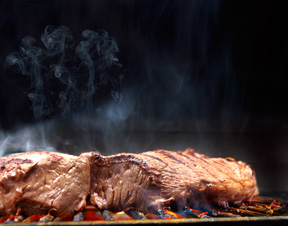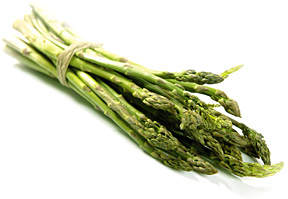Beware of the BBQ
By Jacob Schor, ND
Grilling meat is an inherently dumb thing to do. Here's why: Cooking animal flesh over a hot open flame triggers a series of chemical reactions that yield a meal loaded with carcinogens. Scientists have been warning us about this danger for two decades. Cancer-causing compounds known as heterocyclic amines (HCAs) can form, particularly when cooking animal flesh over high heat, which is common when barbequing. These chemicals – the same chemicals that are found in cigarette smoke – have been shown to cause cancer.
For example, in a Harvard study by Erin Richman and colleagues, results of which were published in March 2010 in the American Journal of Clinical Nutrition, men who ate cooked chicken at high heat with the skin on had twice the risk of having their previously diagnosed prostate cancer return or get worse than those who ate skinless chicken. The researchers' theory to explain these chicken skin findings: The HCAs formed in chicken skin during cooking were the culprit of the cancer relapse.
 Is there a solution; a way to avoid filling your body with HCAs? Don't grill your meat (or don't eat meat at all, since research suggests grilling vegetables does not generate HCAs). The trouble with that "solution" is that we've been cooking dinner over open fires for two million years. Taking pleasure in grilling meat over a fire is so deeply ingrained in our blood that most people aren't about to change.
Is there a solution; a way to avoid filling your body with HCAs? Don't grill your meat (or don't eat meat at all, since research suggests grilling vegetables does not generate HCAs). The trouble with that "solution" is that we've been cooking dinner over open fires for two million years. Taking pleasure in grilling meat over a fire is so deeply ingrained in our blood that most people aren't about to change.
That said, researchers studying the production of heterocyclic amines during the cooking process have discovered a number of "tricks" that may reduce the risks posed while barbequing, either by interfering with the creation of HCAs or inactivating them once they're formed. For example, precooking a hamburger patty for two minutes in a microwave before barbequing reduces heterocyclic amines by a whopping 90 percent, according to research. Adding vitamin antioxidants to the meat or marinating it in antioxidant-rich spices before cooking appears to work almost as well.
When it comes to marinades, there are also important things to know. First, not just any marinade seems to work – old-style tomato-based barbecue sauces actually increase heterocyclic amine production, while marinades like teriyaki sauce reduce heterocyclic amines produced during cooking by half. Those packets of store-bought powder marinades that you add oil and vinegar to also seem to be surprisingly effective.
A 2008 study published in the Journal of Food Science measured heterocyclic amine levels in pan-fried steaks that had been marinated in one of three popular store-bought products. They found "Caribbean Blend" to be the best choice, reducing levels by 88 percent. "Herb Blend" came in second, reducing heterocyclic amines by 72 percent, and "Southwest Blend" came in third, but still lowered levels by 57 percent.
 This isn't product promotion: there's nothing special in any of these mixtures that you can't get just about anywhere. It turns out that many common spices have strong antioxidant effects. Rosemary is particularly effective at reducing production of HCAs, suggests a 2010 study. Marinating chicken in red wine also may reduce production of some heterocyclic amines. Ray Pleva, a Michigan butcher, is famous for adding cherries to his sausage meat. Adding cherry pulp to meat not only makes the burgers juicier, but the fruit also acts as an antioxidant. The cherries prevent heterocyclic amines from being formed, reducing levels by 90 percent. Vitamin E works as well; a single 400 IU capsule is enough to treat 10 pounds of hamburger.
This isn't product promotion: there's nothing special in any of these mixtures that you can't get just about anywhere. It turns out that many common spices have strong antioxidant effects. Rosemary is particularly effective at reducing production of HCAs, suggests a 2010 study. Marinating chicken in red wine also may reduce production of some heterocyclic amines. Ray Pleva, a Michigan butcher, is famous for adding cherries to his sausage meat. Adding cherry pulp to meat not only makes the burgers juicier, but the fruit also acts as an antioxidant. The cherries prevent heterocyclic amines from being formed, reducing levels by 90 percent. Vitamin E works as well; a single 400 IU capsule is enough to treat 10 pounds of hamburger.
There is also another approach to reducing the harm caused by heterocyclic amines. A number of foods have been identified that neutralize heterocyclic amines in the intestine and prevent them from causing DNA damage. For example, several studies suggest that the Lactobacilli strains in yogurt do this, so serving yogurt on or with meat meals provides additional protection because it actually reduces the harmful effects of these chemicals.

